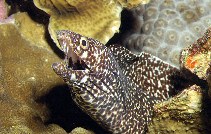| Family: |
Muraenidae (Moray eels), subfamily: Muraeninae |
| Max. size: |
200 cm TL (male/unsexed); max.weight: 2,510.0 g |
| Environment: |
reef-associated; marine; depth range 0 - 200 m |
| Distribution: |
Western Atlantic: North Carolina, USA and Bermuda to Brazil, including the Gulf of Mexico, the Caribbean to southeastern Brazil. Eastern Atlantic: Ascension and St. Helena (Ref. 4450). Mid- and eastern Atlantic islands (Ref. 26938). |
| Diagnosis: |
Moderate-size moray with a pattern of distinct small, round, overlapping dark brownish to purplish-black spots on white or pale yellow background (Ref. 26938). |
| Biology: |
A benthic and solitary species (Ref. 26340) abundant in shallow rocky and grassy areas and on coral reefs; less common in turbid bays or harbors. Its bite is very dangerous (Ref. 5217). Active during the day, sometimes together with other predators. Feeds on fish and crustaceans (Ref. 42064). Usually seen with its head protruding from a hole and the rest of its body concealed (Ref. 26938). Observed to be unusually aggressive towards man (Ref. 86997). It has been traded as aquarium fish at Ceará, Brazil (Ref. 49392). Marketed fresh and salted (Ref. 5217). |
| IUCN Red List Status: |
Least Concern (LC); Date assessed: 18 August 2011 Ref. (130435)
|
| Threat to humans: |
traumatogenic |
Source and more info: www.fishbase.org. For personal, classroom, and other internal use only. Not for publication.
